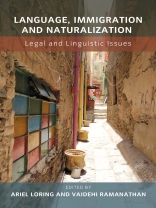This volume focuses on the everyday legalities and practicalities of naturalization including governmental processes, the language of citizenship tests and classes, the labelling and lived experiences of immigrants/outsiders and the media’s interpretation of this process. The book brings together scholars from a wide range of specialities who accentuate language and raise issues that often remain unarticulated or masked in the media. The contributors highlight how governmental policies and practices affect native-born citizens and residents differently on the basis of legal status. Furthermore, the authors observe that many issues that are typically seen as affecting immigrants (such as language policies, nationalist identities and feelings of belonging) also impact first-generation native-born citizens who are seen as, or see themselves as, outsiders.
Tabella dei contenuti
1. Ariel Loring and Vaidehi Ramanathan: Introduction: Language, Immigration, and Naturalization: Legal and Linguistic Issues
Part 1: Policies
2. Michelle (Winn) Baptiste: The Value(s) Of US Citizenship: An Analysis of the English Writing Test For Naturalization Applicants
3. Emily Feuerherm and Russul Roumani: The Journey to US Citizenship: Interviews with Iraqi Refugees
Part 2: Pedagogies
4. Karen E. Lillie: “The ELD Classes are … Too Much and We Need to Take Other Classes to Graduated”: Arizona’s Restrictive Language Policy and the Dis-Citizenship of ELs
5. Paul Mc Pherron: Local, Foreign, and In-Between: English Teachers and Students Creating Community and Becoming Global “Citizens” At a Chinese University
6. Olga Griswold: Language and Body in Concert: A Multimodal Analysis of Teacher Feedback in an Adult Citizenship Classroom
Part 3: Discourses
7. Jasmina Josić: “You Are Part of Where You’re From and a Part of Where You’re Born”: Youths’ Citizenship And Identity In America
8. Jennifer Long: Reinforcing Belonging and Difference through Neighbourhood Gentrification Projects in Rotterdam, The Netherlands
9. Ariel Loring: Ideologies and Collocations of “Citizenship” In Media Discourse: A Corpus-Based Critical Discourse Analysis
10. Ariel Loring: Afterword
Author Bios
Circa l’autore
Ariel Loring received her Ph D in linguistics from University of California, Davis, USA and is now affiliated with UC Davis and California State University, Sacramento, USA. Her interest areas include language policy, language ideologies, discourse analysis, citizenship, immigration and naturalization.












